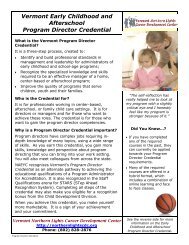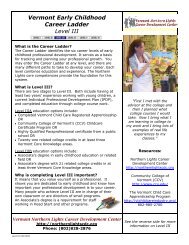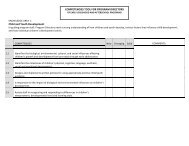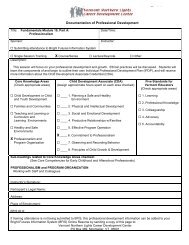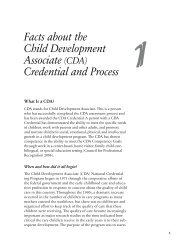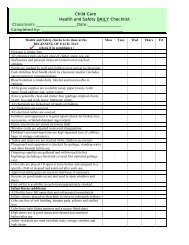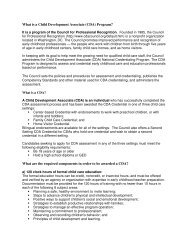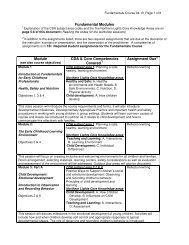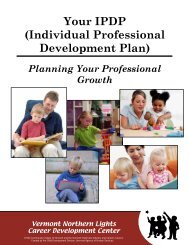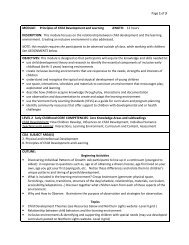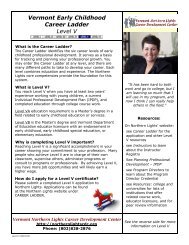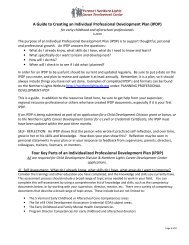1 - Vermont Northern Lights Career Development Center
1 - Vermont Northern Lights Career Development Center
1 - Vermont Northern Lights Career Development Center
You also want an ePaper? Increase the reach of your titles
YUMPU automatically turns print PDFs into web optimized ePapers that Google loves.
PRINCIPLES WORKSHEET: Project/organization: Starting Points Groups in Lamoille Valley<br />
Purpose of this project: to help provide local professional development and support and to increase professionalism of local<br />
provider community<br />
1) Clear and Known<br />
Practitioners know there is a<br />
professional development system<br />
that is available to them.<br />
WHAT WE DO NOW QUESTIONS/ISSUES/GAPS WHAT WE COULD DO/<br />
OUR PRIORITIES<br />
Information sent out by<br />
Starting points leaders: Maybe some redundancy in Consider:<br />
Newsletters and RDS listerve, trainings throughout region -Various ways to advertise<br />
newspaper, fliers; starting (ie PCAVT) . Providers like the -Increase coordination among<br />
points leaders know they are local, small trainings though sponsors, more partnering<br />
part of bigger system; list in and do not see this as a - evaluate when providers do<br />
BFIS course calendar. Tell negative.<br />
go out of local area to attend a<br />
community about what they<br />
training, how to support this<br />
are doing -promotion and More staff are going to starting - how to ensure all trainings<br />
outreach. In addition to the points workshops – which are are comfortable/public<br />
mentioned methods, SP one time workshops; multipart<br />
leaders call and send letters to<br />
workshops are more likely<br />
the providers in their areas to offered by LFC.<br />
promote membership. Some<br />
coordination between LFC<br />
offerings and Starting points<br />
offerings in region.<br />
This is a strength.<br />
2) Supportive of Professional<br />
Growth<br />
Learning opportunities build upon<br />
knowledge and skills in a<br />
systematic and meaningful way.<br />
Support and recognize each<br />
others’ achievements; peer<br />
support for achieving STARS,<br />
Level certificates, etc; share<br />
Providers not always up on<br />
current practice (ie where new<br />
bonus info is kept, new level II<br />
portfolio info)<br />
Consider:<br />
- Incentive to be on career<br />
ladder<br />
- tie in trainings intentionally
Professionals who attain<br />
enhanced knowledge and skills<br />
are recognized and compensated<br />
for their achievements along their<br />
professional career pathways.<br />
WHAT WE DO NOW QUESTIONS/ISSUES/GAPS WHAT WE COULD DO/<br />
OUR PRIORITIES<br />
information about career<br />
to career ladder or STARS<br />
pathways and professional<br />
practices. Starting points<br />
leaders are compensated for<br />
their leadership skills. Support<br />
recognition by the community<br />
for their work.<br />
3) Research-based and Relevant<br />
Useful professional development<br />
content and instructional<br />
practices are based on recognized<br />
and effective standards that<br />
support best practices.<br />
Use instructors in the registry<br />
or local agency or professional<br />
expert; collaborate with RDS,<br />
<strong>Northern</strong> <strong>Lights</strong>, BBF leaders to<br />
ensure best practices are used<br />
and shared.<br />
However, sometimes leaders<br />
find it difficult to find fresh<br />
new ideas and instructors for<br />
trainings in Instructor Registry.<br />
Consider:<br />
Learning about latest researchbased<br />
training and who does<br />
them; check with Head Start<br />
and <strong>Northern</strong> <strong>Lights</strong> (ie IMIL,<br />
FEL, more PCAN modules, PITC<br />
(infant toddler care) etc.)<br />
4) Integrated and Aligned<br />
Professional development is<br />
articulated so that it is recognized<br />
and meaningful across different<br />
systems and work settings.<br />
STARS, CDA, <strong>Career</strong> ladder and<br />
Credentials are all considered<br />
when developing activities in<br />
the context of local needs.<br />
Attends state wide Starting<br />
Points meetings to assure<br />
alignment and are updated<br />
with current activities and<br />
trends<br />
Identifying and promoting how<br />
Professional <strong>Development</strong> and<br />
other work such as support<br />
groups and community work is<br />
linked to STARS and certificates<br />
Consider:<br />
- how does training calendar<br />
as a whole connect to a<br />
variety of levels – is there<br />
interest in higher level<br />
training (ie college<br />
coursework)<br />
- promote higher ed<br />
coursework by having a<br />
cohort attend together,<br />
- have a higher ed faculty<br />
visit to share<br />
information/resources
WHAT WE DO NOW QUESTIONS/ISSUES/GAPS WHAT WE COULD DO/<br />
OUR PRIORITIES<br />
- explore other options such<br />
VSC office of experiential<br />
programs (APL, Course<br />
Challenge, CLEP tests,) or<br />
CEUs<br />
5) Accessible<br />
Professional development<br />
opportunities and pathways are<br />
designed with a variety of delivery<br />
options and are available to<br />
diverse populations and skill<br />
levels.<br />
Open to all providers, parents<br />
and community members;<br />
local and no charge<br />
Is online format a way that<br />
would increase access<br />
Is there enough higher level<br />
and more in depth (multisession)<br />
professional<br />
development available<br />
Consider:<br />
- survey providers about<br />
interest and readiness for<br />
online learning<br />
- support providers to attend<br />
intro to online learning free<br />
workshop at CCV<br />
6) Financially supported<br />
Sufficient and dependable<br />
funding, both public and private,<br />
is available to support quality<br />
professional development that<br />
reflects these principles and<br />
related practices.<br />
Supported by Starting points<br />
grant and <strong>Northern</strong> <strong>Lights</strong><br />
(state$) and fund raising<br />
(private$) and Lamoille Family<br />
<strong>Center</strong> (state and private $);<br />
activities are free of charge<br />
Money needs to be spent by<br />
Dec 31 st . New grant money<br />
doesn’t come in until March or<br />
April, leaving no funds for<br />
Jan/Feb<br />
Consider:<br />
- talking with Jan Walker<br />
about how to address the<br />
funding gap better<br />
7) Evaluated on all of the above<br />
criteria<br />
These principles are used to<br />
evaluate professional<br />
development activities and the<br />
system as a whole in order to<br />
ensure an increasingly proficient<br />
Evaluate workshops and<br />
activities informally- what is<br />
working and what is not and<br />
what presenters were<br />
effective Survey members<br />
reaction to activities and<br />
How can all instructors be<br />
evaluated and what would be<br />
the criteria<br />
Consider:<br />
-design instructor eval and<br />
borrow from NL instructor eval<br />
-design consistent ,simple<br />
participant evaluation tool<br />
based on learning objectives
workforce.<br />
WHAT WE DO NOW QUESTIONS/ISSUES/GAPS WHAT WE COULD DO/<br />
OUR PRIORITIES<br />
interest in future<br />
and application of training<br />
activities/topics. Members are<br />
content<br />
informed about these<br />
- identify outcomes and then<br />
principles and their uses;<br />
how to measure if we<br />
informed about different<br />
addressed them (NL is resource<br />
evaluation methods. Formal<br />
for this- attend advisor<br />
evaluation report created<br />
meeting)<br />
biannually for funder (CDD)<br />
that includes these principles.



